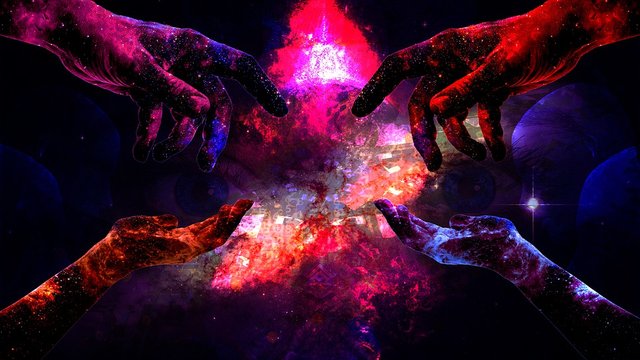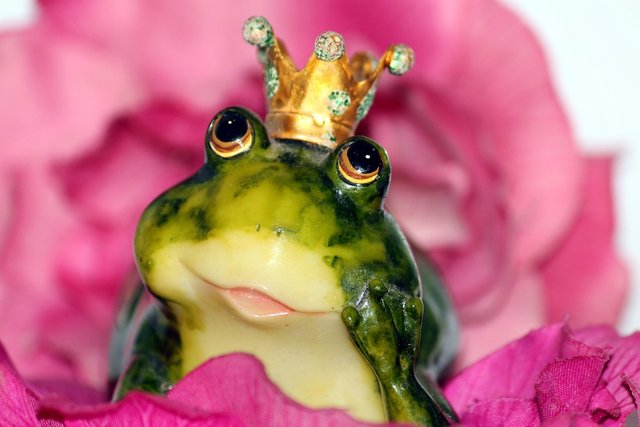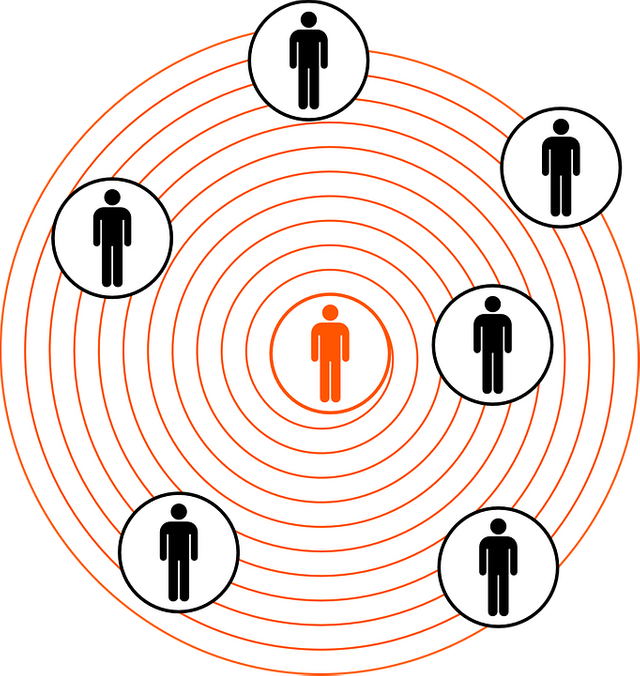The uniqueness of the Ego ⭐ Response ecoTrain QOTW October 14-20
«We must go beyond the constant complain of the ego, beyond the tools of logic and reason, to the quiet and quiet place within us: the kingdom of the soul.»

The human being is a complex wonder. There is no mold that contains it. Each one is one and is all, but we do not assimilate it, we focus on the individual and do not transcend deeply into the collective. This peculiar way of developing our potential in different dimensions distracts us from the true objective so that we have "Free will". We are with others and yet we do not appreciate it in its fair value. There are many internal distractions that make us look at relatively irrelevant and thoughtlessly submerged foci in the Ego.
What is the root of the conflict between men?
"Unhappy people are not successful, and there is no achievement or money to modify this equation."
The Ego exacerbated is one of the reasons that cause divergences among human beings. The first grammatical person contains the singular and the plural of the point of view I and WE, Ego and Nobis, in Latin. Both are deployed to be and act from within. It is not about another or them, but rather the intimate being that inhabits us or the group of beings to which I belong. And at this point the notion of BELONGING is interesting. I am detached from attachments, but I am also when I am in communion with others and I feel that I am where I belong: Family, community, society, culture.
But what happens if I, as a person in formation and growth within a family group, did not develop the vision of the we in equivalence with the I am? Then, we notice that there is a familiar component in many aspects of the way we relate to the world. At the same time, there is a genetic component because inheritance contains certain information that passes from generation to generation. Without neglecting, the cultural component is very important because it is learned a lot and extends through cultural exchange. And we advance on the slope of what society teaches us to live fully, discovering that we are trained to work, be "successful", compete to be better in whatever we develop; but it does not prepare us to love us, it does not prepare us to be happy. Success is measured in the accumulation of capital: how much you have, how much it is worth. And, definitely, not in how much you love, how much you share, without the dreaded selfishness that is one of humanity's evils.

What exacerbates our ego?
"Most people think and act within the narrow limitations of what they have been taught since childhood, without questioning the basic assumptions on which they have structured their worldview."
Most human relationships begin based on the enthusiasm and participation of all parties involved or, at least, the part that believes in the project undertaken. However, these motivational factors are a starter, a strategy of our brain to accommodate and enjoy the changes that require strength, competence, accumulation of experiences and achievements.
We give a lot of ourselves when we start a project, but that momentum energy decays over time and it is other forms of exchange that cause the overflow to occur. It is like planting a garden, it is not enough to sow, you have to water, you have to love every detail of the growth of the plants, you have to be present and not abandon when the rains, the plagues, the drought. But that requires maturity and a strong commitment not only with the garden, but with the gardeners with whom we share life, because we have to polish ourselves, share responsibility for the beautiful and not so beautiful, for the common work and the objectives achieved.
But what manages to get us out of our center, even if we have worked, cultivated and nurtured consciously? The resurgence of mental schemes that were believed to be overcome: expects that the other or others have the same level of growth, the same delivery, the same commitment, the same faith. So, if what we "expect" does not happen, a veiled resentment process begins, an internal irritation that has to do with a truncated hope: the hope of consciously constructing the idea of plurality, our "we"; but that is not intrinsic, it does not depend only on one, but on the cooperation of others, along with one. And, it is that we are as fragile as the illusion of perfection: "We are perfectly imperfect humans".

Do people bother us or do we let them bother us?
"What you hate most is what you deny most in yourself. What you love most is what you most desire within yourself. Use the mirror of relationships to guide your evolution."
What we see in others, we have it, this is the Law of the mirror and "states that in some way that aspect that we dislike of a certain person exists within us." A form of defense of our mind that is activated in cases of emotional threat. If we feel disgusted with what we live, we begin to perceive defects and anomalies in what initially made us fall in love: "Being aware of what we project in others allows us to discover how we really are." So, it is not the people who annoy us, they are our misguided projections.
What we perceive through our senses outside constitutes a source of learning that we must take advantage of. Only selfish people believe they are self-sufficient. If we cultivate in our being humility and the will to learn from everything and everyone, the path of acceptance and forgiveness will open paths to reach our own understandings and satisfactions based on collective achievements. But you have to learn it.
According to my referential framework, parenting and culture play a leading role in the assimilation of ideas about life in communes. I had a wonderful father who consciously worked the "we" as a family and built a clan with strong parental ties, but it did not make us sociable or people who feel comfortable with strangers. Latin Americans, we are essentially attached to the family, it is difficult for us to fly alone and initiate forms of community exchange. In us, it deprives a strong and widespread cultural pattern.
In my country, the government promotes communes and communal forms of administration that have failed because of the lack of preparation and real experience, is something imposed from the altered vision of a dome that preaches without setting an example; they are state capitalists and subject the people to the misery of a corrupt form of distribution of wealth, supposedly administered by the "people", and of town or community has nothing but the participation of people willing to take the best chop of the banana of the "people" and, submerged in lies and deceptions, live their fantasy of working for the good of others.
The uniqueness of the "I"
"The purpose of life is the expansion of happiness. Happiness is the goal of all other goals."
Instinct continues to prevail over personal growth in many aspects. We play to be human, we try to develop by uncovering the veil of old conceptions that keep us tied to distorted ways of sharing space and life in common.
The most notable peculiarity of the "I" is its power to transform itself into a better person when it grows towards the "We", becoming plural and it is this plurality that has the capacity to change relations in the world. "We" together we have the light and strength to be better, to change the old precepts based on the domain of "Ego" in the world: "I am who I am", so proclaimed and misused; Enthronement of the "Being" to a status of power of one over the other and not the necessary balance of being inside to nourish and nurture the outside.
The mind makes us live an illusion of power by aggravating the "I" above the "We." And, here is the dilemma that arises: "To be or not to be" to evolve into "We", in direct proportion to the importance of plurality for consciousness. We are better people when we unify and seek the well-being, the harmony and the happiness of all; when we identify the ego as a source of discord and separation before the purpose of advancing as a species towards the fullness of Love at its best, when we transcend from "I" to "we."


15/10/2019
This is my participation for the ⭐ ecoTrain QOTW Oct 14-20: What is the root of conflict between mankind? What needs are not being met?
The images are from Pixabay CC0 Creative Commons:
Geometry by Calerox88
Frog-prince by Counselling
Ego by Geralt
Concentrical by OpenClipart-Vectors
Separators:
Cat
Simplemente Gracias
For your kind reading, simply THANK YOU

Posted from my blog with SteemPress : https://zeleiracordero.000webhostapp.com/2019/10/the-uniqueness-of-the-ego-%e2%ad%90-response-ecotrain-qotw-october-14-20
Okay, finally I had time to read your article attentively, so I could give you a thought-out reply.
Until the last part of your post I had this feeling that I should defend the ego, of which I am a great fan of. I don't agree with spiritual movements that want to deny it, ignore it, or transcend it. I believe it is here for a reason, and in this current consciousness it is our job, our challenge, to work with it.
Of course, I also think that we are supposed to be together, do things together, which is really the only way to achieve anything. Still, whenever we pull in the same direction, it is not one big collective, with a singular mind, but a lot of individuals, doing it all individually, each for their own reasons, according to their own decisions. I think that's important.
Then I read your last part The Uniqueness of the "I" and realized that I don't have to explain this to you, because you seem to be well aware of it. And yes: The individual has the power to transform itself... not others, but itself for sure. And in order to achieve a stronger WE, I think the trick is not to merge with each other completely, but recognize that there is another I in YOU.
Are you familiar with the term "I and I"? You can find it a lot in Rastafarian music (and I assume literature). It assumes that using words like I and YOU causes separation, but I&I (which is also not WE, as that would necessitate the opposite THEY) acknowledges the other person as another I, including them in our idea of the self "I".
(Okay, I know, this can be weird to talk about, because they are also just pronouns, which our language uses in a certain way, enabling us to communicate. So altering that would also change the understandability of what we say. But I like the philosophical idea behind it.)
A very interesting approach brings me your comment, @stortebeker. The I & I, as a form of union and return to oneself and others, perhaps, and not from separation. It is true, it is not the same you and I, that a self that respects another self. Thank you for the careful reading and understanding of my intention to respond in the QOTW.
Best regards and a hug!
beautiful post @zeleiracordero .. There are so many gems, perls or wisdom packed into this post.. its very special. Thank you for putting SO much into this.. I hope someone would talk about the ego, and the deeper spiritual currents that move us..
Again, I tell you I thank you more, @eco-alex. You always challenge us with such interesting questions. Your point of view honor me.
This post was shared in the Curation Collective Discord community for curators, and upvoted and resteemed by the @c-squared community account after manual review.
@c-squared runs a community witness. Please consider using one of your witness votes on us here
Thank you!